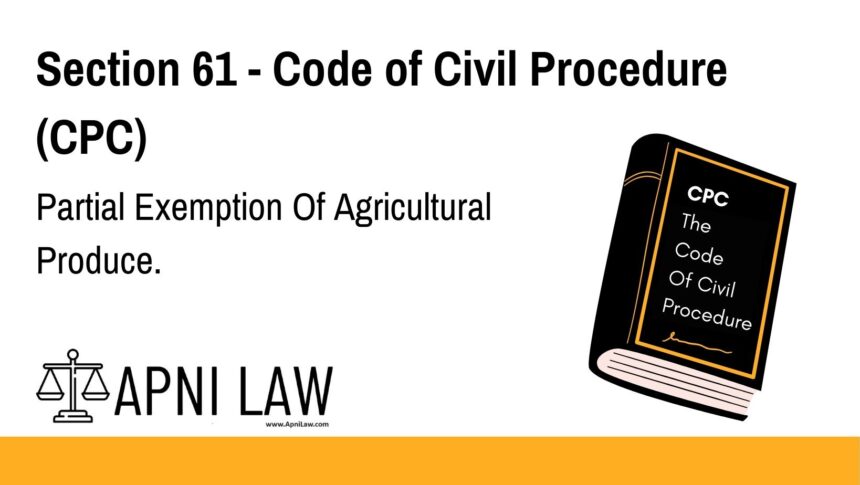Code
CPC The State Government1*** may, by general or
special order published in the Official Gazette, declare that such portion of agricultural produce, or of any
class of agricultural produce, as may appear to the State Government to be necessary for the purpose of
providing until the next harvest for the due cultivation of the land and for the support of the judgmentdebtor and his family, shall, in the case of all agriculturists or of any class of agriculturists, be exempted
from liability to attachment or sale in execution of a decree.
Great — this is Section 61 CPC, which deals specifically with exemption of agricultural produce from attachment. I’ll draft it for you in the same structured SEO-optimized format we’ve been using.
Section 61 CPC – Exemption of Agricultural Produce from Attachment
Code: Section 61 of the Civil Procedure Code, 1908
61. Partial exemption of agricultural produce.
The State Government may, by general or special order published in the Official Gazette, declare that such portion of agricultural produce, or of any class of agricultural produce, as may appear to the State Government to be necessary for the purpose of providing until the next harvest for the due cultivation of the land and for the support of the judgment-debtor and his family, shall, in the case of all agriculturists or of any class of agriculturists, be exempted from liability to attachment or sale in execution of a decree.
Explanation of Section 61 CPC
This section recognizes the special status of agriculturists in India and protects them from being deprived of essential produce needed for their livelihood and cultivation.
Key Points:
- Power of State Government:
- The State Government can issue general or special orders in the Official Gazette.
- It can exempt either all agriculturists or a specific class of agriculturists.
- Scope of Exemption:
- Covers agricultural produce such as grains, seeds, pulses, fruits, etc.
- The exemption applies to the portion required for:
- Due cultivation of land until the next harvest.
- Support of the agriculturist and his family.
- Objective:
- To ensure that agriculturists are not deprived of basic livelihood and farming inputs.
- Prevents exploitation of farmers during recovery of debts.
- Relation with Section 60 CPC:
- Section 60 already exempts tools, cattle, and seed-grain of agriculturists.
- Section 61 provides a further safeguard by empowering the State to exempt essential agricultural produce.
Illustration
- Example 1: A farmer owes money under a decree. If the government notifies that wheat required for the next sowing season is exempt, the creditor cannot attach that portion of wheat.
- Example 2: State Government exempts rice up to 5 quintals for every agriculturist household to ensure food security till next harvest. That quantity remains safe from attachment.
Common Questions and Answers
1. Who decides what agricultural produce is exempt?
The State Government, through notification in the Official Gazette.
2. Does the exemption apply to all farmers?
Yes, it can apply to all agriculturists or to a specific class of agriculturists, depending on the notification.
3. Is the entire agricultural produce exempt?
No. Only that portion declared by the State Government necessary for subsistence and cultivation until the next harvest is exempt.
4. Why is this exemption necessary?
To prevent farmers from being pushed into destitution by allowing them to retain essential produce for survival and future cultivation.
5. Can creditors still recover their dues?
Yes, but only from the non-exempt portion of produce and other attachable property of the judgment-debtor.
Conclusion
Section 61 CPC reflects the legislature’s protectionist approach towards agriculturists, safeguarding them from complete deprivation in debt recovery. It ensures that while creditors can enforce decrees, farmers retain enough produce to feed their families and continue cultivation.
For detailed insights on execution proceedings and agriculturist protections, visit ApniLaw.








